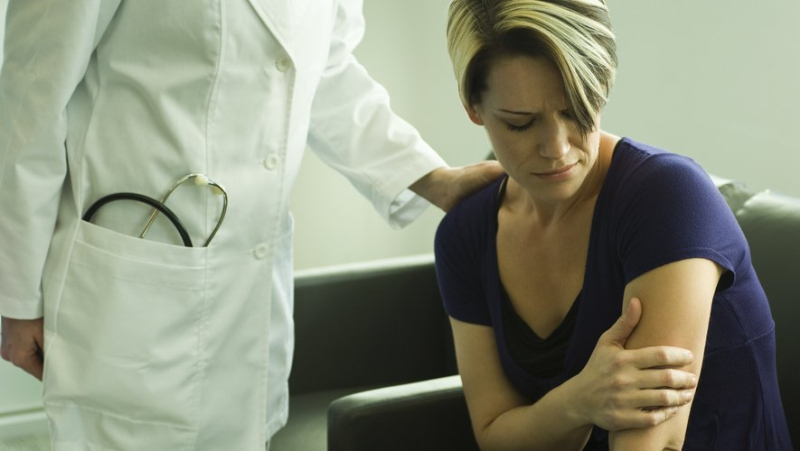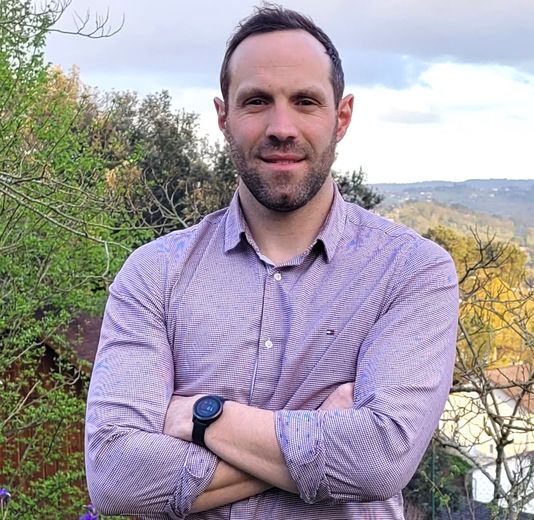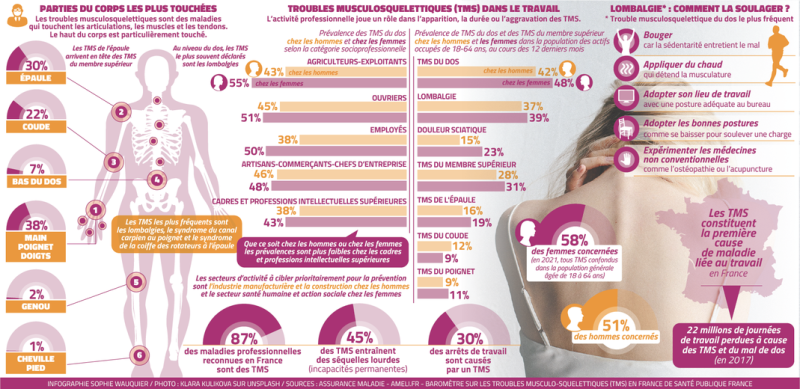More than one in two French people suffer from it: “Musculoskeletal disorders are an alarm”

Women are no less affected than men. MAXPPP – Michèle Constantini
They constitute the leading cause of work-related morbidity, and the leading cause of occupational illness: MSDs, musculoskeletal disorders, have invaded our daily lives, nearly 60% of women and one in two men report today suffer from the back or upper limb, mainly at the shoulder level, indicates a study by Public Health France. This is not inevitable.
Corentin Chasles, holder of a master's degree in adapted physical activity, is responsible for health and safety at work in the private sector. Former consultant and trainer on TMS, he published on April 24 "Vaincre les TMS" (ed. In Press, 13.90 €).

Corentin Chasles: “Overcoming” MSDs. DR
One in two French people suffers from a musculoskeletal disorder, according to the latest data from Public Health France, and MSDs are the leading cause of morbidity linked to work, the leading cause of compensated occupational illness. This is worrying?
Yes, a majority of the working age population has, has had or will have a MSD problem in their professional career. It’s dizzying to see so many people affected by these issues.
And what is also worrying is the future. Young people entering the job market are also starting to be affected earlier and earlier. We even see more and more young children starting to complain of back pain. They are not yet in the world of work statistics.
Even before they are worn out…
A sedentary lifestyle, screens and lack of physical activity disrupt the balance between fat and lean mass in young people.
As soon as we put them in positions that require physical commitment, they will be more fragile. In the appearance of MSDs, our professional activity, which represents 80% of our day, plays a major role, but also the extra-professional life which leads us either to mistreat our body, because it’s we are sedentary, or accumulate tension by getting involved.
Let's be clear, MSDs are not linked to too much jogging, or weight training…hellip; there is a professional component.
Yes, that's for sure. But someone who is on a laptop all day, and who also plays the piano or guitar as a leisure activity, will be in a context that could lead them to suffer from MSD more quickly.

One might, however, have thought that bodies were subject to less tension with technological evolution…
The first part of the body affected by MSDs is the hands. It’s our first work tool, whether we are behind a machine or a PC. Despite the solutions provided by ergonomics, we must ask ourselves questions about our behavior at work.
L’Health Insurance defines MSDs as "the result of an imbalance between the physical capacities of the body and the demands and constraints to which it is subjected is exposed". It’is inevitable with our lifestyles, sedentary lifestyle, screens, stress…
TMS is multifactorial. The psychosocial components should not be neglected in their appearance, among others, stress and the working atmosphere.
I often give the example of an accounting secretary who explained to me that she had so much work at the time of the balance sheets that she had tension which accumulated in her her trapezius muscles, she had neck pain, she felt "stiff".
Stress creates tension, installs stiffness which will add to TMS problems, many of which are linked to the muscles. I often say that our muscles are a "costume".
There is also the’work atmosphere, the feeling of an absence of recognition… the body and the mind are linked. MSDs are an alarm of a health problem at work.
"People are often fatalistic. We must act"
You've heard from hundreds of people who suffer from MSD, what do they say?
People are often fatalistic: "I have back pain, like everyone else". Or "I have back pain because I have scoliosis"… They get into a vicious circle, they let it go, and when the stiffness becomes pain, they take medication, then they go to see the doctor, possibly the physiotherapist who gives them exercises that they don't always do.
People rarely ask themselves what is causing things to go wrong: perhaps it is the problem of the workstation which is not adapted, or lifestyle habits, with a lack of ;rsquo;physical activity. You have to act, change your lifestyle, change your daily life, your little habits. We wake up too often when we're against the wall.
The risk is that MSDs become a handicap.
To "defeat" TMS, the title of your book to be published at the end of the month, what should you do ?
You have to start by knowing your body, it seems simple, many people don't know it.
Then you have to maintain it, prepare it. We are starting to see, on construction sites, collective warm-ups before starting work.
You need to resume physical activity. Before, we told people to stop moving when they had back pain, now it's quite the opposite.
You have to stretch your body, soften it, as you "clean" a machine.
And to "clean" the mind, we must speak, not remain isolated. And when I'm upset, I stop for 15 seconds and breathe. You have to take care of yourself.
I subscribe to read more




